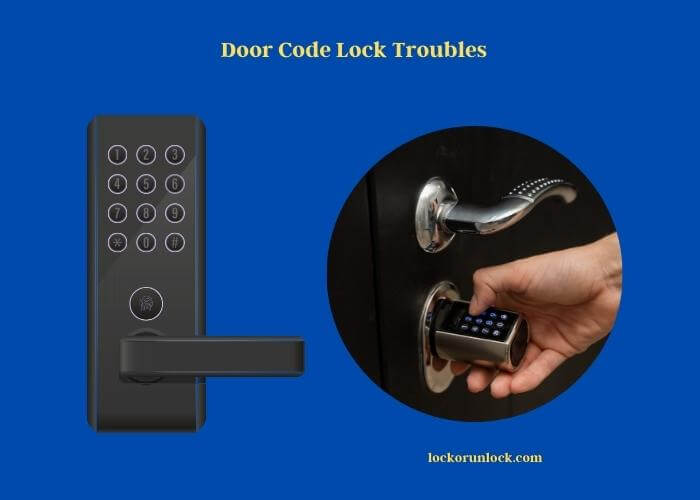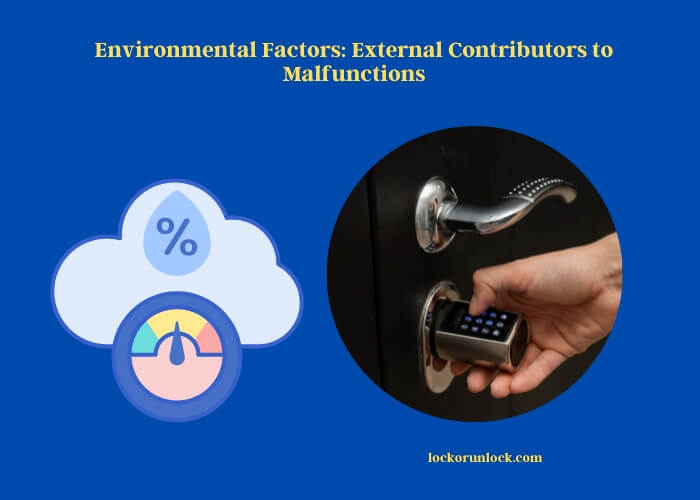Door code locks are modern security devices that occasionally face issues. Whether it’s forgetting the code or facing a mechanical glitch, users can encounter difficulties.
Keypad door locks provide both convenience and security, but like all devices, they can sometimes malfunction. Push button code door locks can stop working for various reasons ranging from dead batteries to internal wiring problems. Similarly, electronic door locks can pose challenges when they refuse to open, even with the right code or key. For those wondering how to open such locks without a key, there are techniques that involve resetting the lock or using specialized tools.
In some cases, the August lock, a popular brand, might not unlock manually due to jamming or a calibration issue. Another common problem some users face is the keypad door lock’s knob or handle spinning without granting access. This could be due to a misalignment inside the lock mechanism. To address these concerns, one must first diagnose the specific issue. Once identified, solutions might range from changing the batteries to fixing the digital door lock components.

To navigate these challenges and learn step-by-step troubleshooting methods, the detailed article below provides valuable insights and actionable solutions for various door lock issues.
Door Code Lock Won’t Open: Comprehensive Solutions
Have you ever been locked out because your door code lock just refused to cooperate? Yep, it’s frustrating. But, good news! We’ve got your back. This guide is all about helping you figure out what’s going on with that stubborn door code lock and how to get it working smoothly again. Let’s jump right in!
Common Reasons Behind Door Code Lock Malfunctions
Battery-related issues
So, did you know that just like how our phones run out of juice, your door lock might be facing the same problem? A weak or dead battery can sometimes be the culprit. It’s like trying to start a car with a dead battery – it just won’t budge.
Internal wiring problems
Think of your door lock as a mini computer. Sometimes, the little wires inside can get frayed or disconnected. It’s kind of like when your headphone wires get twisted and suddenly the sound cuts out.
Environmental factors affecting the lock
Have you considered the weather lately? Just like how your hair reacts to humidity (hello, frizz!), door locks can also react to environmental changes. Too much moisture or extreme temperatures might be causing the hiccups.
User input errors
Let’s face it, we all make mistakes. Maybe you’ve been pressing the wrong button without realizing, or perhaps the lock is just feeling a bit finicky today. Who hasn’t forgotten their password at least once?
Diagnosing the Problem: A Step-by-Step Guide
Observation: Initial signs and symptoms
The first step? Observation. Just like a doctor checks for symptoms, you’ve got to play detective. Is the keypad lighting up? Are there weird sounds? Observing these can give you clues.
Technical diagnosis: Using diagnostic tools
Ever watched a mechanic plug into a car’s computer to find the problem? Similarly, there are diagnostic tools for door locks too! They help pinpoint what’s amiss.
Comparative table: Symptom vs Likely Issue
| Symptom | Likely Issue |
|---|---|
| Keypad not lighting up | Dead battery |
| Keypad lights up, but no response | Internal wiring issue |
Battery Concerns and their Impact
How battery health affects lock function
Imagine running a marathon on an empty stomach. Tough, right? Your lock feels the same with a weak battery. A healthy battery ensures smooth functioning.
Lifespan of different battery types in door locks
| Battery Type | Lifespan |
|---|---|
| Alkaline | 8-12 months |
| Lithium | 2-3 years |
Signs of depleting battery power
Does your lock feel like it’s dragging its feet? Slow response or dim lights might hint at a battery that’s saying goodbye.
Replacing the battery: Best practices
Changing the battery isn’t rocket science. Make sure to check the manufacturer’s recommendations and, if possible, stick to the same battery type.
Wiring Woes: What Goes Wrong Inside?
Typical wear and tear over time
Much like old headphones start losing sound, door lock wires can fray over time. Regular checks can prevent sudden malfunctions.
Troubleshooting and fixing wiring issues
Contacting a professional is often the best bet here. Unless you’re a whiz with electronics, it’s easy to get tangled in the web of wires.
Environmental Factors: External Contributors to Malfunctions

Humidity and moisture damage
Door locks can throw a tantrum in humid conditions. Moisture can seep in and cause damage. It’s like how electronics go haywire if water gets inside.
Temperature fluctuations and their effects
Remember how chocolate melts in the sun? Door components can expand or contract, causing issues.
Percentage breakdown of environmental factors affecting door locks
User Errors: Misconceptions and Mistakes
Incorrect code entry
We’ve all been there – typing the wrong password or mistyping a digit. Give it another shot and double-check!
Forgetting the code and override solutions
Lost in the maze of passwords? It happens. There are usually override keys or reset functions to help you out.
Misaligned lock components
If things feel out of place, it might be due to misaligned components. It’s a bit like a puzzle; every piece needs to be in the right spot.
Effective Remedial Measures for Various Issues
Resetting the lock for quick fixes
Think of this as the classic “turn it off and on again”. Sometimes, a quick reset can clear minor glitches.
Professional interventions vs DIY solutions
There’s no shame in calling for help. Some issues are best left to professionals, while others can be a fun DIY challenge. Ready to roll up your sleeves?
Calculator: Cost estimator for lock repair or replacement
Cost Estimator
FAQs
Can Power Door Lock Malfunctions also Cause Door Code Lock Troubles?
Power door lock malfunctions can indeed cause door code lock troubles. One of the common reasons for lock malfunctions is a faulty electrical connection, which can affect both power locks and code locks. Additionally, issues with the lock mechanism itself, such as a broken latch or a worn-out motor, can lead to problems with both types of locks. It is important to address lock malfunctions promptly to ensure both your power door locks and code locks function properly.
What Can Be Done When the Deadbolt Knob Spins?
When the deadbolt knob spins without engaging, it might be due to a misalignment with the strike plate or wear over time. Try realigning the strike plate or consider replacing the worn-out parts of the lock mechanism.
Are There Steps to Open a Door with a Code Lock?
Yes, typically, you’d enter the correct numeric or alphanumeric code via a keypad or touchscreen interface. If entered correctly, the door should unlock. Make sure to refer to the lock’s manual for specific instructions tailored to your model.
Why Is My Electronic House Door Lock Not Working?
Several factors can affect an electronic lock: drained batteries, software glitches, or mechanical issues. Begin by checking the power source, and then move on to resetting the lock or referring to the manufacturer’s troubleshooting guide.
How Can I Fix a Keypad Door Lock?
Begin by identifying the specific issue, like unresponsive keys or incorrect code errors. Replace batteries if they’re drained, clean the keypad from dirt or grime, or consider a reset. If these steps don’t work, you might need professional assistance.
Is There a Method to Unlock a Code Door Lock?
Absolutely. Most code door locks can be unlocked by entering the correct code. Some advanced models also have alternative unlocking methods such as key override, fingerprint recognition, or emergency power supply.
Does Schlage Door Lock Spinning Indicate a Problem?
Yes, if a Schlage lock just spins, it’s often a sign of a malfunction, potentially from internal wear and tear. It may need reinstallation, realignment, or, in extreme cases, replacement.
What Should I Do If My Touchpad Door Lock Isn’t Working?
First, check the batteries; they might need replacement. Clean the touchpad surface to ensure no dirt is affecting its sensitivity. If it still doesn’t work, consult the lock’s user manual or contact the manufacturer for further assistance.
You May Also Like:
- Locks and Art: Discovering the Aesthetics of Security
- Are Kwikset Locks Good? Is It Reliable for Home Security?
- Locks and Privacy: How Technology Can Keep You Secure
- Locks and Safety: How Locks Can Keep You Safe
- Mortise Locks: How They Work and Why They’re So Secure
- The Future of Locks: Innovations and Advancements
